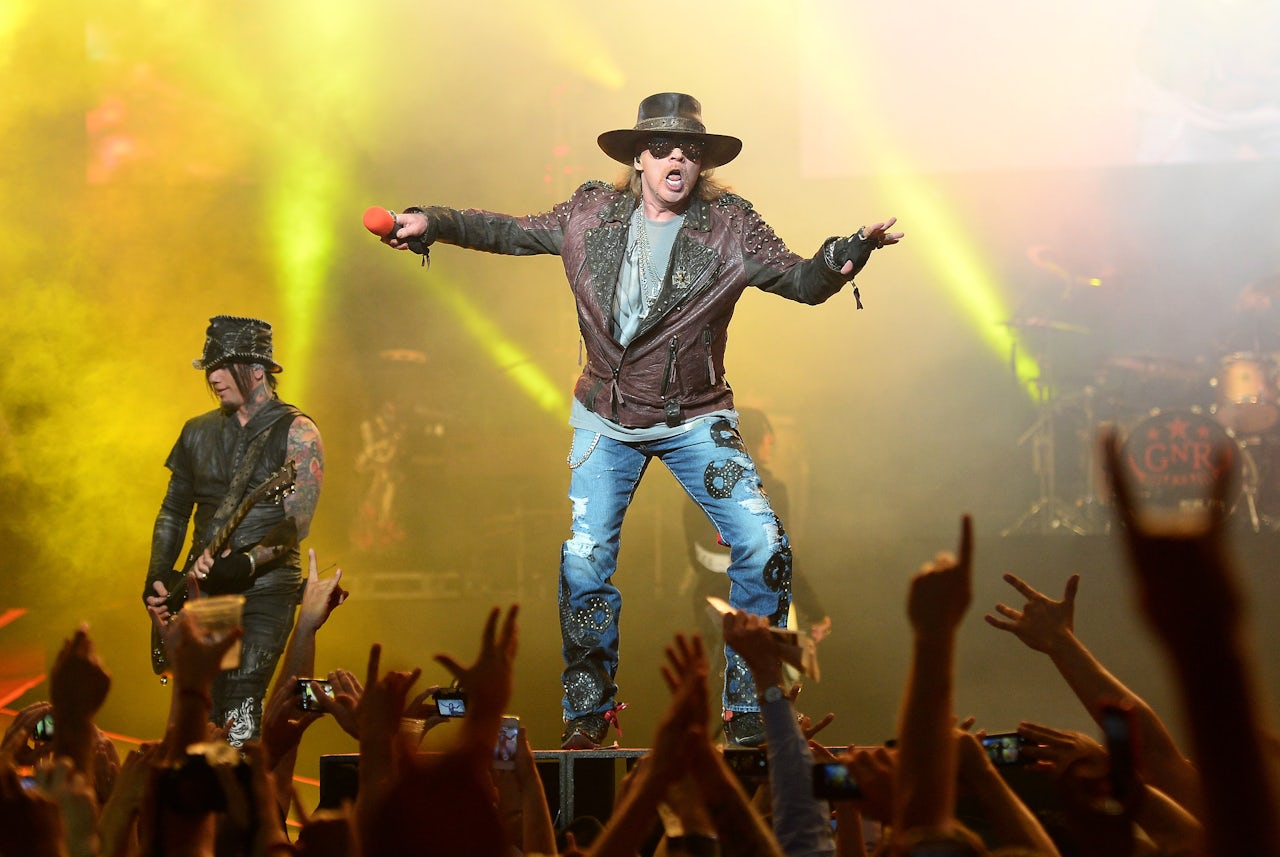Recently, Guns N’ Roses frontman Axl Rose has made headlines for criticizing Donald Trump on Twitter, an ongoing conflict through most of 2018. His political awokening may surprise listeners, but as he rages against the machine — taking care to preserve the signature “n’” spelling in each of his tweets — it’s easy to think about another, lesser remembered part of Rose’s politics: his real, albeit tentative criticism of the Chinese Communist regime.
Longtime fans of Guns N’ Roses will remember the title of their last studio album, Chinese Democracy, which was released in 2008 following a very, very long incubation process. Though Rose didn’t exactly fashion the music into a concept album about free Chinese elections, in an alternate, limited-release CD booklet for the album he included a 1200-word treatise on the repression and “emotional bondage” experienced by the greater Chinese population. It sounded a lot like the start of a script of a awareness-raising commercial for starving children:
What if nearly everyone and anyone could literally be a government informant for information regarding remedial discussions in areas of human rights; Buddhism, Tibet, the Dali Lama [sic], different systems of government, religion or spirituality or conversing about and with anything other than disdain for the way of life, government and commerce in western society? If you were born into such a predicament and circumstance, what would you do?
What if you felt so helpless and afraid that you were compelled to sell your own child you love because you cannot afford the financial penalty and other consequences due to China's 'one-child' rule?
What if your contact with the world outside your country was controlled by your government to the degree that you had no real awareness of even basic global current events? What if you lived in a country where the discussion of a word associated with the name of your country, such as “democracy,” in any manner but disdain could bring severe consequences, what would you do?
The answer, Rose wrote, was that “you would suffer… daily.” (He added the ellipses for emphasis, not me.) He then went on to address the deliberately provocative album and song title, emphasizing his wish to “open a dialogue in areas not necessarily focused on both current events and global social responsibilities.” A dialogue between who, he did not specify. His plea for an actual conversation wasn’t unexpected, given the political climate in 2008. That year, the Free Tibet movement managed to make international headlines following endorsements and campaigning from celebrities such as Richard Gere, whose Hollywood success suffered for his fervent advocacy for Tibetans under Chinese occupation.
Near the end, Rose warned that economics and the “severe realities of China as a super power [sic]” would curb public opposition to the regime. Ten years later, Rose’s prediction has come true: despite the regime kidnapping labor activists, and growing political repression in Hong Kong and Macau, international pressure on the regime has mostly subsided, beyond Trump’s fixation on the Chinese economy’s growth, and the occasional China hawk popping up in Trump’s cabinet. For his part, Rose demurred when it came to solutions, oscillating between his deeply-felt responsibility to bring the issue to the international spotlight, and his admitted lack of policy knowledge. The knowledge that he did have was primarily emotional: “What I felt was emotional heartbreak,” he wrote. “I've never witnessed so many individuals going about their lives in such a degree of visible fear, especially the average citizen in the spectrum of social, economic or social position.”
The Chinese government reportedly banned the Guns N’ Roses album from being sold on account of its name, though Geffen Records, which managed the release, hadn’t expected “to obtain approval to distribute the album in mainland China.” A state mouthpiece denounced the record without naming the band or Axl Rose, calling it part of a Western plot to “grasp and control the world using democracy as a pawn.” It’s funny in hindsight to think that the regime banned a record with the questionable distinction of featuring a protest song that doesn’t really protest anything. “Chinese Democracy” has a long build-up from harsh Mandarin whispers overlaid on muted guitar riffs, and has one reference to Falun Gong, a spiritual practice which has been outlawed in China for its protests against religious persecution. “Chinese Democracy,” does, however, valorize the inevitable push-comes-to-shove moment that would allow the disenfranchised and the downtrodden to rise victorious over an unnamed Chinese state. The state couldn’t entertain that kind of mindset whatsoever.
Rose was inspired by the 1997 film Kundun, directed by Martin Scorsese, which followed the life and times of the 14th Dalai Lama. In a 2001 Las Vegas set where he debuted the song, Rose acknowledged that “Chinese Democracy” channeled the emotion from the movie’s ending, where the Dalai Lama looks at all the men who have helped him escape from the Chinese regime, knowing that they would be murdered because of him. Said Rose: “It’s not necessarily pro or con about China, it’s just that right now, China symbolizes one of the strongest, yet most the oppressive countries and governments in the word. [Americans] are fortunate to live in a free country. And so in thinking about that it just kinda upset me, and we wrote this little song.”
Rose doesn’t give a lot of interviews, and he’s rarely explicit about his politics. In 2012, he told Jimmy Kimmel he “leans Obama”; despite the ugliness of “One in a Million,” his most infamously hateful song, he’s made subsequent comments championing diversity and lamenting bigotry. His political approach seems more emotional, as he’s never publicly contributed to a political campaign or even to the cause of democratizing China. He sees a thing, feels bad about it, and then sets his anger or disenchantment to a tune, or, in the age of the Internet, pours his heart into Twitter. Who amongst us hasn’t dealt with the minor inconveniences of structural racism and capitalism like so?
